
My sweet seatmate and me on the bus home from Sigatoka
If you’re serious about the pursuit of happiness, spend time in Fiji. Fijians have rated themselves the happiest people in the world. We don’t doubt it.
I’ve been giving quite a bit of thought to the pursuit of happiness – my own and that of others – while we’ve been staying in Fiji.
People from Fiji are happy. Fijians have rated themselves the happiest people in the world, too. Virtually every day here in Fiji, we encounter others who are kind, respectful, accepting and joyful.
This kind of thing is infectious, of course, and not limited to Fiji. After we moved to Kaua’i, we started noticing changes in ourselves. We’d been ready to let go of mainland mentality in favor of the pursuit of happiness, but we didn’t realize until several months in how radical a transformation this would be.
We were experiencing a sort of reverse Hedonic adaptation. All around us on Kaua’i were folks who had given up mainstream life in the continental U.S. in favor of a pursuit of happiness that felt more true.
This translated into living more simply with fewer things. Keeping up with the Joneses gave way to appreciating Kaua’i’s grandeur, as well as holding oneself to a high standard in personal improvement and spiritual development worthy of such beautiful surroundings. We were greatly affected.
Just as we prepared to leave Kaua’i for Fiji on the start of our RTW trip, we received an email from Kulraj Singh, who had seen our article from 2012 and had been thinking about the pursuit of happiness as well.
Kulraj had also researched the Hedonic Treadmill and written a very scholarly post on the subject on his blog. His conclusion? Happiness is an adaptable variable with no set point.
Kulraj’s article reported on research which suggests that specific events do not have the largest impact on overall happiness, but the beginnings and endings of significant life changes do.
In conjunction with his article, Kulraj created a 4-Week Hedonic Treadmill Implementation Worksheet (you can get it here) which has tactics to help you habituate a strategy toward long-term happiness. First, Kulraj suggests focusing on acts of service and appreciation for two weeks. You then move on to implementing best practices in your relationships and passionate pursuits. This is a simple, yet profound program that anyone can implement in their own pursuit of happiness.
We learned to smile more and practice aloha in Hawaii. But here in Fiji, this mindset scales up to an entirely different level. We’ve learned to greet everyone we encounter with “Bula!” In Fiji, it’s customary to wave to strangers and acquaintances alike passing by at some distance, whether you or they are in a vehicle or on foot. When you meet someone’s eyes, or pass someone in the store, invariably they smile and you do, too. Hop on a bus and while you’re finding your seat, you’ll be “bula-ing” all the way down the aisle. If you come upon two together, you say “Bula” twice.
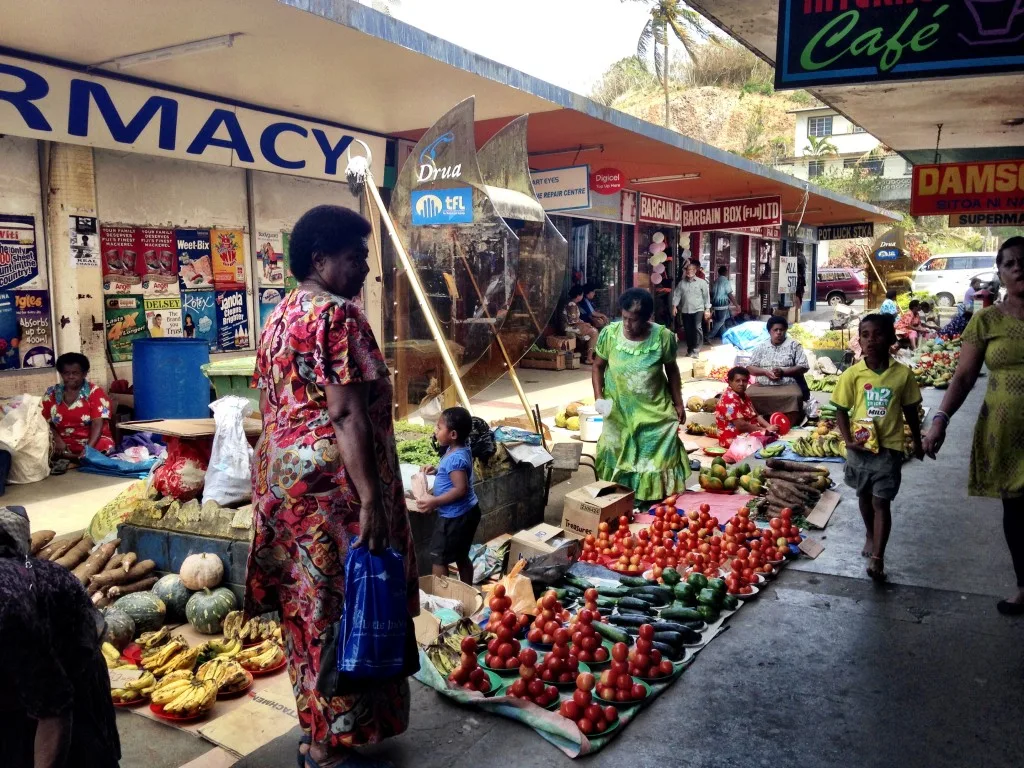
Street Market – Sigatoka
Fijians are curious and want to know where are you from and what is it like there, how you like Fiji, how long have you been here, where do you stay and how long do you have left on your visit. For the privacy-minded, this can be a little disconcerting. You learn to respond with a gentle vagueness which is still polite and respectful. If you must say no to an invitation or a request, you say, “Maybe next time.” But there’s a reason for this that goes deeper than just curiosity.
A few days ago, we had lunch at the resort next door, and the security person came over and introduced himself, as we hadn’t yet met. In the space of five minutes, we knew Emory had been born and raised in Korotogo Village half a mile away, what his job entailed and then, when he discovered we were Americans, that his late father had collected photos of Elvis all his life. When he learned we’d been to Graceland, the conversation was off and running.
In Fiji, there is always an attempt to establish commonality, no matter how remote. Sometimes this can feel a little awkward, like a bit of a stretch. But, it isn’t mere curiosity, it’s connection. Culturally, this process signifies each of you has value. That’s a big deal. When the pursuit of happiness is studied, inevitably the concept of self-worth comes into play.
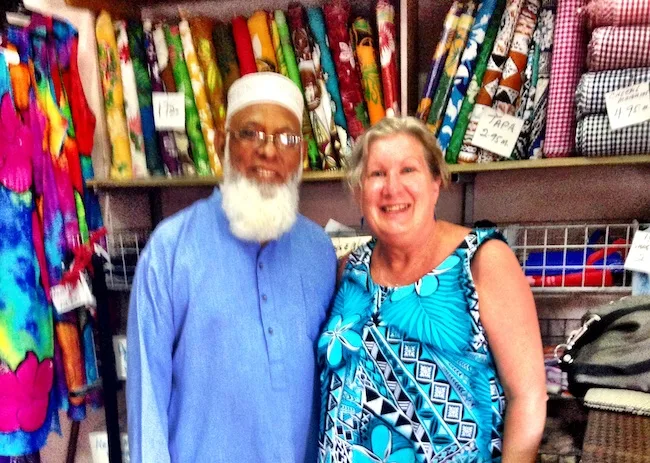
Sulemon the Tailor with Me in My $20 Dress
Today, as we walked through his neighborhood waiting on the bus to come up behind us, we encountered Emory with a large machete in hand. In any other locale, this may have been cause for caution: Emory’s an imposing guy. How were we today, yes, this is his home over that way and he was going to chop some cassava. We walked on and the bus came around the bend as expected.
About a week ago, we were walking to another restaurant in the neighborhood, and an individual came into view far down the street. Suddenly, he began waving his arms high above his head and yelling “Bula!” As we were the only ones in sight, we waved back. This continued until we’d approached sufficiently to recognize him (with our poor old people eyesight) as someone we’d met only once before. Enthusiastic hand pumping and wide smiling. You’d have thought the most important thing in his life was seeing us again. This made us happy.
When you first arrive in Fiji, you may be taken aback at how simply people live. Some might even characterize the standard of living as impoverished or suboptimal by comparison with the comforts and luxuries available in other countries. The Satisfaction of Life Index rates Fiji #57 in between Argentina and Israel. In this index, Fiji happens to rate ahead of France, Chile, Japan and Thailand. But since it correlates subjective well-being with social and economic development, Fiji falls far behind the usual suspects (Scandinavia, Western Europe, Canada, the U.S.). In the #1 slot? Denmark, despite the morose countenance of every Dane I’ve met.
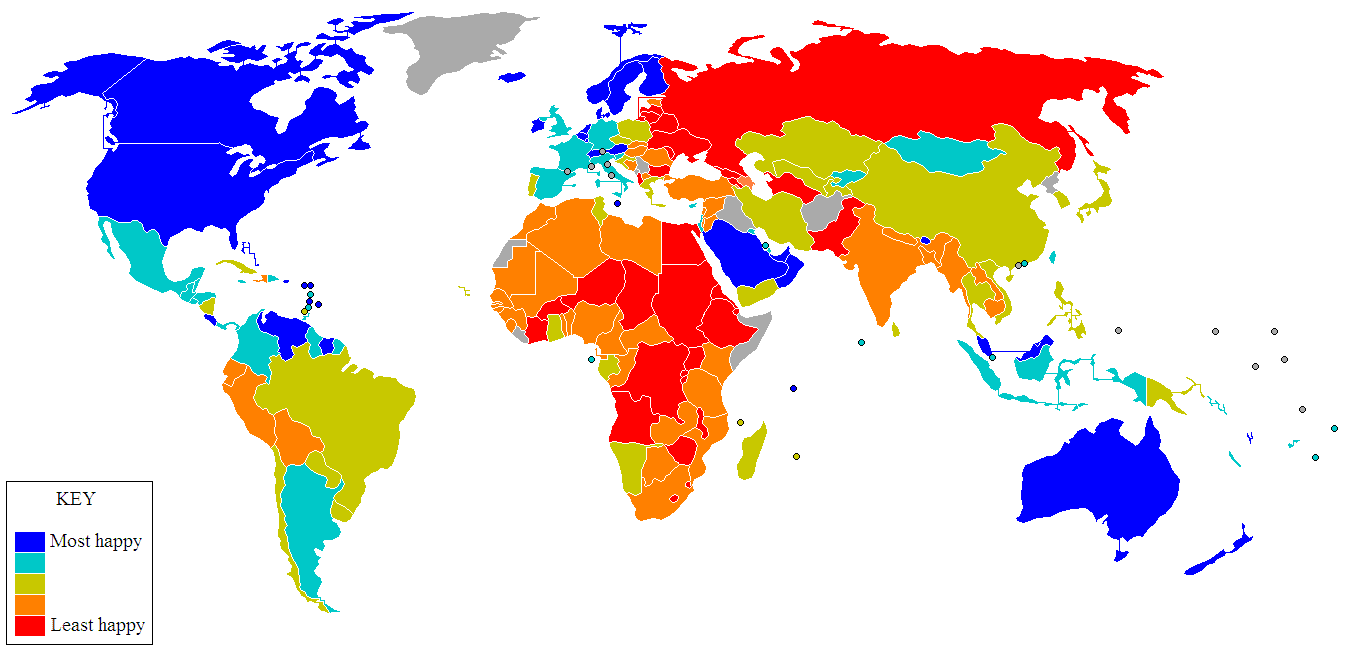
Satisfaction of Life Index Map
Fiji fares better in the Happy Planet Index, coming in at #36, ahead of Iceland, Luxembourg and Germany, and far above Australia, New Zealand and the United States. This index was weighted to give progressively higher scores to nations with lower ecological footprints, challenging GDP and HDI indices, and citing the usual aim of most people is “not to be rich, but to be happy and healthy.”
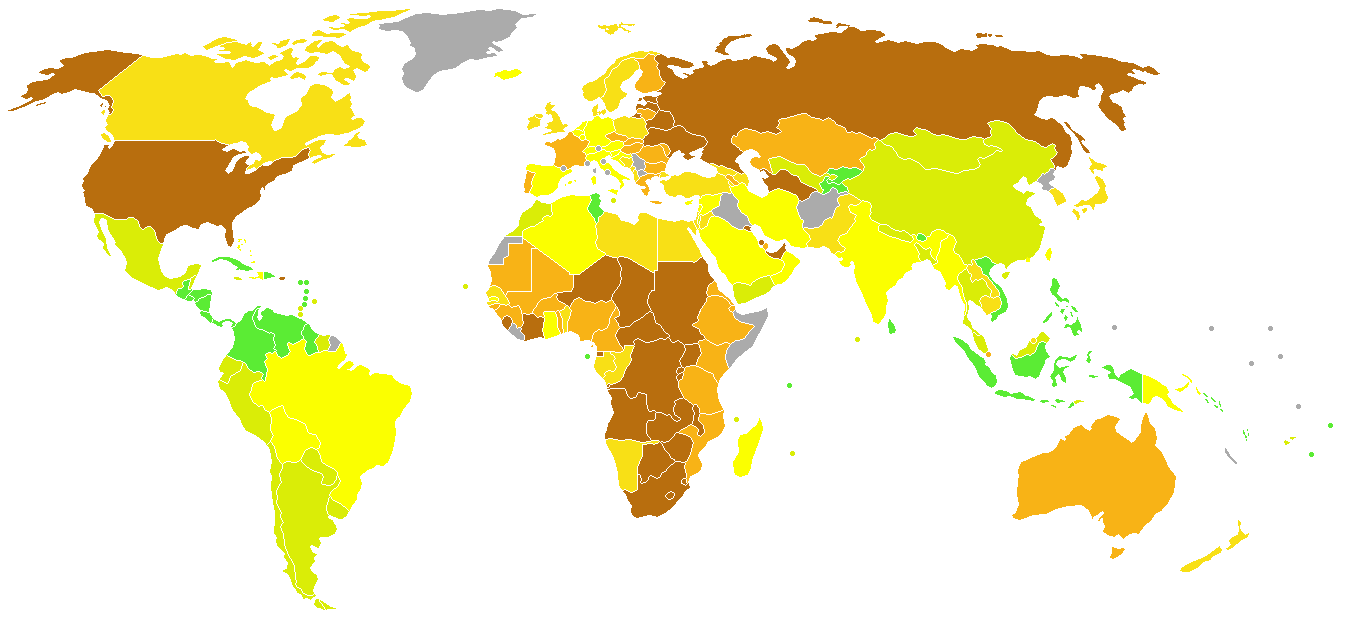
Happy Planet Index – Photo Credit: Original uploader was Super cyclist at en.wikipedia Later version(s) were uploaded by Nom DeGuerre at en.wikipedia. – Transfered from en.wikipedia. Licensed under Public domain via Wikimedia Commons
Gross National Happiness, introduced in the Kingdom of Bhutan and adopted by several countries, including Thailand, is an idea that is also catching on. The UK, Australia, China, France and even North Korea are all indexing happiness. Not surprisingly, North Korea puts itself in the #2 happiness position right behind China.
It just may be impossible to sort and interpret happiness on a metric. The pursuit of happiness can be more about managing expectations and reducing comparisons after all, so these studies could be flawed at premise. No matter in terms of life on Fiji.
We’re headed into Sigatoka town today to shop for fresh produce and fish at the local market, where things are colorful and lively. We’ll ride the bus, which stops for passengers wherever they might be alongside the road. It will even wait for someone who might be a little slow in coming. There will be catchy music on the bus, blaring from speakers outside the video rental, and coming from most of the stores. We’ll see friendly faces of all kinds and hear chatter in languages we don’t understand.
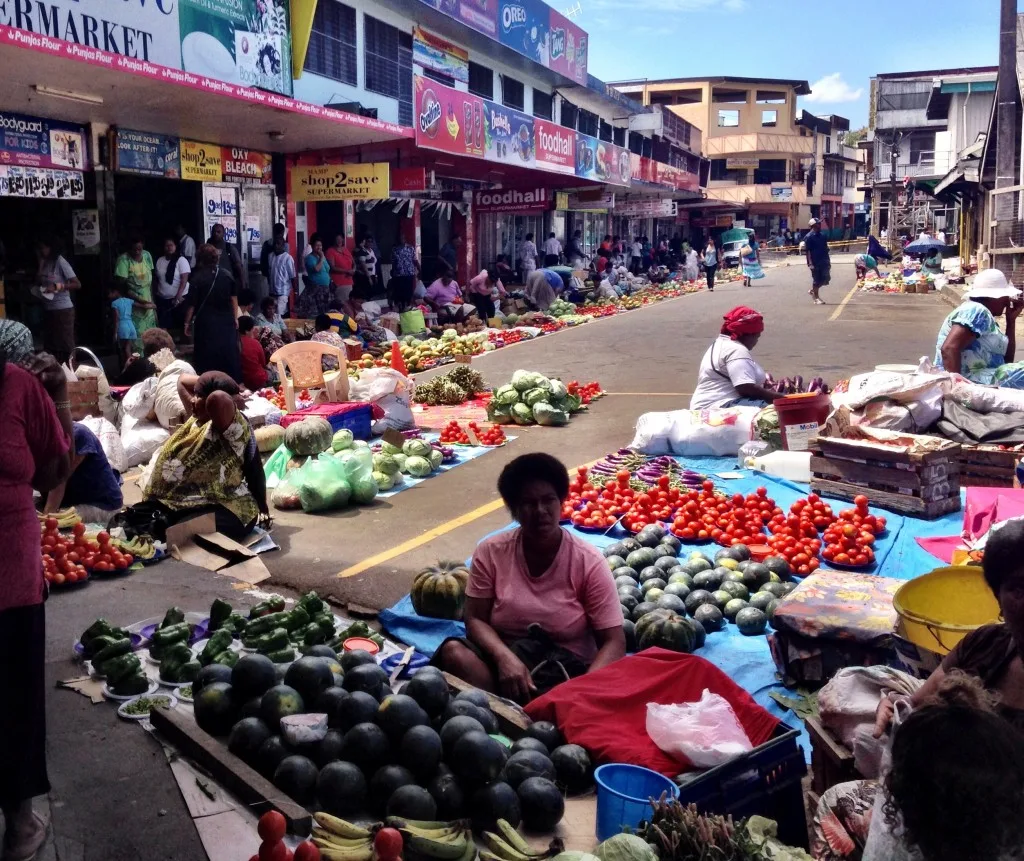
Street Market – Sigatoka
But most of all, we’ll smile and greet, just as everyone smiles and greets us. We’ll be the first to say bula or we’ll respond in kind. When we descend from the bus, complete our purchases and exit the taxi, we’ll be reminded to have a blessed day. And it will be.
In Fiji, happiness isn’t pursued. It is lived.
Tips for Trip Success
Book Your Flight
Find an inexpensive flight by using Kayak, a favorite of ours because it regularly returns less expensive flight options from a variety of airlines.
Book Your Hotel or Special Accommodation
We are big fans of Booking.com. We like their review system and photos. If we want to see more reviews and additional booking options, we go to Expedia.
You Need Travel Insurance!
Good travel insurance means having total peace of mind. Travel insurance protects you when your medical insurance often will not and better than what you get from your credit card. It will provide comprehensive coverage should you need medical treatment or return to the United States, compensation for trip interruption, baggage loss, and other situations.Find the Perfect Insurance Plan for Your Trip
PassingThru is a participant in the Amazon Services LLC Associates Program. As an Amazon Associate I earn from qualifying purchases.
To view PassingThru’s privacy policy, click here.

International Travel Safety Don'ts - A Baker's Dozen - Passing Thru
Monday 21st of December 2015
[…] 4. Don’t go to Fiji. The government is a military regime. (Yes, yes it was. Now it’s somewhat not. It’s still beautiful and the people are lovely.) […]
Brandon @ Green Global Travel
Monday 2nd of March 2015
Great post! Thanks for sharing!
Betsy Wuebker
Monday 2nd of March 2015
Thank you, Brandon.
Savusavu: Fiji's Hidden Paradise - Passing Thru
Monday 22nd of December 2014
[…] Fiji and the Pursuit of Happiness […]
Fiji Time - Passing Thru
Monday 24th of November 2014
[…] We talked about this before ( “Fiji and the Pursuit of Happiness”): […]
Shelley
Thursday 23rd of October 2014
I love this post! The local people are what makes the most lasting impression on our travels, so we need to get to Fiji! I was also reminded that wealth isn't connected to happiness on our recent trip to the Philippines. Living in poverty, nevertheless smiling and being friendly is just their way. Bula!
Betsy Wuebker
Thursday 23rd of October 2014
Bula Shelley - You are so right. It is a marvelous thing to connect with people on the other side of the world.